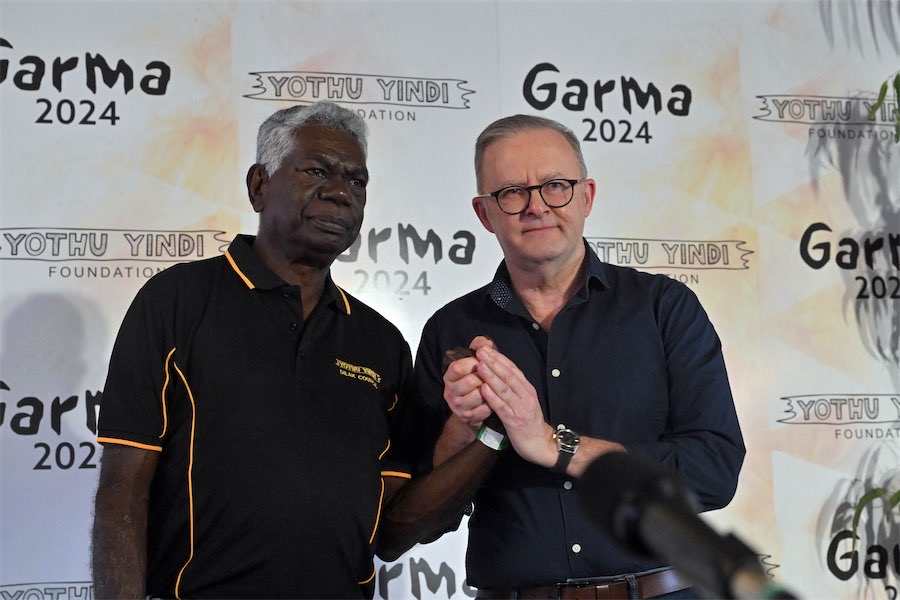
Anthony Albanese’s pivot to indigenous economic empowerment in his weekend Garma speech was welcome and overdue – but now he’s bogged in a contradiction over his commitment to Makarrata, writes political columnist MICHELLE GRATTAN.
On any ordinary interpretation of what Anthony Albanese is saying, the prime minister wants to reshape the government’s commitment as being to a process, rather than a new body.

He told a Sunday news conference: “We’ve said Makarrata is a process where we’re talking through what the nature of that process is.
“Makarrata is a Yolngu word that means coming together after struggle. It is important that we come together.”
Asked whether he was redefining his commitment to Makarrata, Albanese had a one-word answer, “No”.
Yet not only has the government talked about a tangible body, a Makarrata commission, in the past – it backed that with hard money.
The October 2022-23 budget said:“The government will provide $5.8 million over three years from 2022–23 to commence work on establishing an independent Makarrata Commission to oversee processes for agreement making and truth telling.
“This is part of the government’s $27.7 million election commitment to establish a Makarrata Commission.”
Government sources on Sunday said the money remained – although it is hard to find exactly where it is. There was no new money in the May budget.
It’s clear from Albanese’s Garma speech the government is leaving the issues of treaty and truth telling – key elements of the Uluru Statement from the Heart – to the states and territories.
He said: “We welcome the work state and territory governments are doing to advance treaties, agreement-making and truth-telling processes.
“Every approach is different, that is a good thing.
“It reflects the fact that the process is being shaped by First Nations people in each jurisdiction.
“Our government supports these efforts, we want to see them succeed – and we will give them the time and space to do so.
“We remain committed to Makarrata, that powerful Yolngu word gifted to the nation, for a coming together after a struggle.
“And we will continue to engage in good faith with leaders and communities to decide what the next steps should be at a national level.”
The PM appears to be walking away from the commission – for now, or forever – while not being willing to say he’s doing so. But given the budget commitment (whether it still exists or not) he needs to explain, including by saying what is being done with that money.
Apart from the shapeshifting on Makarrata, Albanese’s speech gives to the government’s indigenous policy approach much-needed attention on economic development, including its importance in closing the gap and ways of pursuing it.
As he says, the energy transformation does open opportunities for indigenous involvement. Also his stress on working with the Coalition of Peaks, which represents a wide range of indigenous organisations, is a positive step.
What is needed, as the Productivity Commission has pointed out more than once, is a changed bureaucratic culture that is much more willing to hand over decision-making to indigenous groups, or in some cases to share the power.
There is another sort of sharing needed in Aboriginal affairs – more bipartisanship. New Minister for Indigenous Australians Malarndirri McCarthy says she wants to reach across the political aisle.
But the opposition is unwilling. Neither Peter Dutton nor his spokeswoman Senator Jacinta Nampijinpa Price are likely to see much advantage in co-operating, although post referendum, the government’s emphasis on economic development should make some bipartisanship easier.
Unfortunately, the referendum defeat has encouraged the opposition to savour the fruits of negativity. Whatever political advantages negativity might bring, it won’t help Indigenous people.
Meanwhile Albanese will have two major challenges with his economic empowerment policy.
He has to sell it to indigenous constituencies, some of whom have become so heavily focused on issues of Makarrata, truth telling and treaty that they may be slow to embrace the switch to economic development.
Secondly, the government has to effectively help indigenenous communities and leaders, and companies and investors, make the plan work.![]()
Michelle Grattan, Professorial Fellow, University of Canberra. Republished from The Conversation.
Who can be trusted?
In a world of spin and confusion, there’s never been a more important time to support independent journalism in Canberra.
If you trust our work online and want to enforce the power of independent voices, I invite you to make a small contribution.
Every dollar of support is invested back into our journalism to help keep citynews.com.au strong and free.
Thank you,
Ian Meikle, editor








Leave a Reply